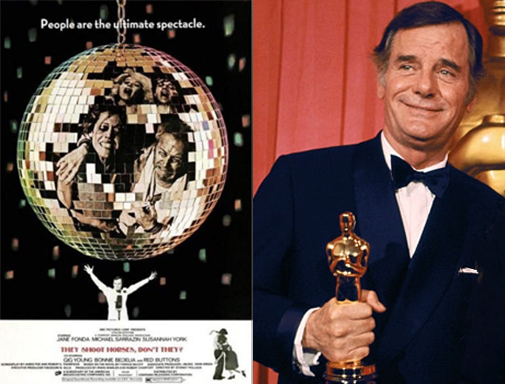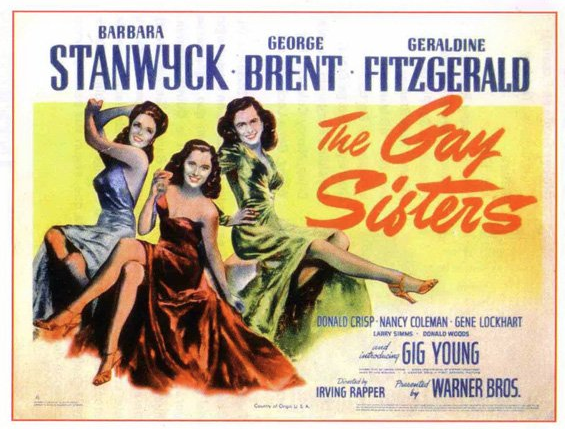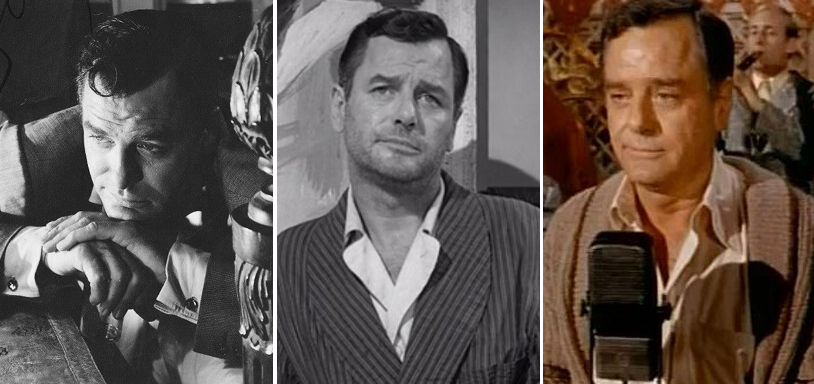50th Anniversary: The strange case of Gig Young's Oscar
 Wednesday, April 29, 2020 at 12:00PM
Wednesday, April 29, 2020 at 12:00PM As a sequel to our recent look-back at the 42nd Oscars , please welcome guest contributor Orrin Konheim...

Fifty years ago, the Academy Awards marked an odd milestone when they awarded a Best Supporting Actor Oscar to Gig Young for They Shoot Horses Don’t They (1969) although they didn’t know history was being made at the time. Eight years later, Gig Young would shoot his wife of three weeks (and then himself) in the only known instance of an Oscar-winning actor committing murder.
His tale is a disturbing one with few answers...

Gig Young was a steady character actor for three decades with an honorable war record in the Coast Guard to boot. Born Byron Barr, he came to Hollywood from Washington D.C. shortly after high school on the condition that he pay half his friend’s gas budget and worked as a used car salesman until he got a scholarship to the prestigious Pasadena Playhouse. From there, he got a contract with Warner Brothers and in a film called The Gay Sisters (1942) he played a character named "Gig Young" whose name he immediately adopted. Though it was his fourth credited role his billing was "and introducing Gig Young" as you can see on the poster.
In addition to his steady career, Young was a charming presence to the public as a favorite guest of Johnny Carson as well as a host of a pseudo-talk show launched by Warner Brother’s Studios’ new television division.
Actor Al Lewis summarized Gig Young’s career of his friend: "He was always the best friend of the guy who gets the girl, he was never the guy.” He starred in four films with Doris Day and he would be passed over for Cary Grant.
All this occurred while Young was having severe mental issues. While he was known for his congeniality on sets, those who knew him better could tell he had his own sense of paranoia. “Gig was a wasted human being…he was like a manic-depressive and paranoid,” a source told the National Enquirer after his death. His first marriage eroded while he was overseas during the War and his second was a natural death from cancer, but his third (Elizabeth Montgomery of “Bewitched" fame, 1956-1963) and fourth wives (realtor Elaine Young 1963- 1966) reported mental and physical abuse. Montgomery described him as having an internal loneliness in his obituary and former lover Harriette Vine Douglas said “he did everything to keep his mind off his own emptiness” later adding “He could win an Oscar and walk away two weeks later feeling like he was a total failure.”
He also exhibited a strange paranoia after his divorce to Elaine Young and attempted to disown his daughter, Jennifer, by launching a five-year lawsuit absolving himself of paternity (he lost). Young felt that denying his daughter was a reaction to the disappointment of divorce and hoped he might eventually come to accept her again.
 Gig Young's Oscar nominated roles: Come Fill the Cup (1951), Teacher's Pet (1958), and They Shoot Horse Don't They (1969)
Gig Young's Oscar nominated roles: Come Fill the Cup (1951), Teacher's Pet (1958), and They Shoot Horse Don't They (1969)
Things were more compounded with his mental state when he went to “Therapist to the Stars” Eugene Landy for treatment in the mid-1960s. Landy is best known for sabotaging the recovery of Beach Boy Brian Wilson (dramatized recently in the film Love and Mercy) and had his license revoked by the state of California in 1991. Gig Young developed a valium addiction that might have had something to do with a therapist not administering it correctly.
They Shoot Horses Don’t They was by all accounts a career highlight for Gig Young though he’d been nominated twice before. Based on a 1935 novel about the depression-era trend of dance marathons, They Shoot Horses Don’t They portrayed the trend for the nightmare fuel that it was: unimaginably desperate people breaking down physically and emotionally for the slimmest chance at a few hundred dollars. The protagonist’s role of the suicidal Gloria allowed Jane Fonda to show she could be more than a pin-up girl (see Barbarella), the film also displayed Young in a new light. As the event’s promoter and announcer, Rocky who reveled in the cruelty of the spectacle without a hint of irony. Like Young’s inner life, Rocky encapsulated the joint persona of a man who performed well on stage but who had a weariness about the grimness of his reality in poignant images that found him positioned in front of a mirror staring at himself.
When Lewis was on the set of They Shoot Horses Don’t They he told Gig that he had a shot to win an Oscar because “no one had seen Gig Young sweat before.”
Over the next eight years, Young’s alcohol, drug use, and other undisclosed ailments became visible and he became far less in demand by producers. On the first day of shooting for Blazing Saddles he was carried off in an ambulance from convulsions. Gene Wilder would later make his part of “the Waco kid” famous. While the common story is that he was drunk, his recorded diaries indicated he was having an epileptic episode (another clue as to his complex mental state).
Peers said the pressures of trying to break out of limiting supporting roles mounted on him but Young remained as congenial right before his demise as he was during his prime. In a newspaper interview just six weeks before his death (eerily entitled “Survivors”) and a televised interview a few months prior (embedded above), one can see a man doing great work in the theater, optimistic about his future, and ready to put the past behind him.
In an interview with the National Enquirer shortly after his death, Paul Steiner, an author and close friend of Young revealed that the actor had skin cancer (something Young hadn’t disclosed): “When big parts, great parts… didn’t roll in (after his Oscar win)… he started a sad descent toward disaster. He had skin cancer… he was afraid of growing old.”
On an October afternoon around 2:30 p.m. in a New York City apartment, Gig Young shot a bullet through the back of the head of his new (and fifth) wife, Kim Schmidt, followed by one into his head. Schmidt was just 31 years old and Young was 64. To further compound the lack of context, Young had a peculiar habit of tape recording his therapy sessions and kept a meticulous diary as well. That diary, though, was unfilled during that doomed marriage (the last three weeks of his life). Police didn’t have much to go on either but they did surmise that it wasn’t a pre-meditated murder.
Gig Young was buried by his sister in North Carolina and the grave bears his birth name but doesn’t mention his illustrious career. Simply his birth and death. The star left behind $200,000 and an Oscar that was lying right next to him when he died. He called winning the Oscar “the greatest moment of my life” and it meant a lot to a couple other people who fought a court case over the physical possession of the statue in 1997 between his manager Marty Baum and Jennifer Young . Perhaps due to his loneliness, Young developed a strong attachment to Baum for never giving up on him (he takes up the bulk of Young’s Oscar acceptance speech) and bequeathed him the statue. Baum used the statue as a window ornament at his office but the two eventually agreed that she would get it upon his death. In 2009 when Baum passed away, Gig's once disowned daughter finally inherited the statue.
Orrin Konheim is a regional journalist in DC and Richmond, a contributor to a smattering of film publications, a fan of The Film Experience for over a dozen years and blogger at sophomorecritic. You can follow him on twitter. He is taking donations at this difficult time for his film research and writing through his new patreon account.



Reader Comments (24)
Yikes. I heard he killed himself, but I didn't know about the murder/suicide. I remember him as the charming leading man in a movie with Shirley Jones that was filmed in my hometown (San Diego). It always popped up on the local independent channel. Something about the Navy and a balloon?
His such a sad story,he was fantastic again just 1 year after the Oscar in Lovers and Other Strangers.
Mental illness is a cruel monster,so many people although great at life always wish they could do better or be adored more,it usually ends up crushing them.
Hey everyone, I'm the author of the piece. Thanks everyone for reading an for Nathaniel for accepting my guest contribution.
Believe it or not, I actually started getting into Gig Young in 2011 so I'd been wanting to tell this story for 9 years and was hoping to find a window to publish it at the 50th anniversary mark and I felt honored to go after Nathaniel's fantastic write-up of the 1969 ceremony.
Originally in 2011, part of my fascination was that Jennifer Young had an internet presence herself as she was promoting a documentary and was a lot more vocal at the time (she sort of had an attempt at a singing career going too). I actually never knew what happened to that and her 2011 social media outlets (i.e. MySpace) no longer exist.
Again, i volunteered this article so if anyone wants to contribute to my patreon so I can do more film research and writing, and journalistic writing in general, i'd appreciate it
Pam: this is the film (The Ticklish Affair)
https://www.imdb.com/title/tt0057583/?ref_=adv_li_tt
Well, this was an incredibly sad and fascinating read.
I haven't seen his other nominated roles, but Horses is such a masterpiece. I bet he won by a country mile.
Gig Young's win belongs with the wins of Walter Huston, Walter Matthau, Jack Nicholson (1983), Martin Landau and Christoph Walz (2009) as performances for which awards are superfluous. They would be remembered as superb even if there were no awards being handed out.
Wow, I vaguely remember reading about him after seeing They Shoot Horses... for the first time, but I had forgotten just how tragic his life was. He clearly had many demons and it's just so sad that he actually sought help only to see his mental illness exploited. It adds a new layer to his Oscar-winning performance.
One of the very best Supporting Actor winners
thefilmjunkie: And, because Dr. Landy (sigh), we have no real idea how he might have wound up with a less...suspect...doctor. Maybe (even probably) not great, but might not have gotten to murder level unstable...?
The dark side of Hollywood
It's always so sad to read that someone who gave so much pleasure to audiences was so tortured behind the scenes.
Whenever he shows up in a film, comedy or drama since he was adept at both, it's a welcome addition. It's understandable that he longed to be the romantic winner but it's a shame he couldn't take some degree of satisfaction in being so good as the charming rogue.
I've seen A Ticklish Affair, the film that Pam mentioned, which offered him a rare chance to be the romantic male lead and end up with the leading lady, Shirley Jones. It's a sweet family film with a terrific cast, in addition to Young and Shirley there is also Carolyn Jones, Edgar Buchanan and his Horses co-star Red Buttons in a role very far from the tragic Sailor.
Very interesting, if necessarily sad, article.
Good read, Orrin,
I just wrote a review for 'That Touch of Mink,' which I'm posting on the one year anniversary of star Doris Day's passing.
I was a bit familiar with Gig Young's story, but I was surprised that Gig's role in 'Mink' was that of an alcoholic and therapy-addict. This seemed strange to play for laughs given his real life situation.
Upon further research, I was surprised how often Gig played alcoholics. In fact, all three of his Oscar-nominated roles are alcoholic characters.
It also amazes me Gig could feel hopeless just after winning an Oscar. Plus, he had one an Emmy for 'The Neon Ceiling' just a year or two later. What should have been a rich second act as a character actor was derailed by his interwoven illnesses. What a shame.
I read up on some of this when I was researching that deep-dive on the 42nd Academy Awards but ended up not writing much about Young. This is a beautiful, though sad, piece that helps paint the picture of a tragic life. Thanks for the wonderful writing and research.
I used to live next door to his daughter Jennifer in West Hollywood. She was definitely an odd one....did not survive that upbringing unscathed.
I don't believe that Rocky could be classified as an alcoholic nor was he a particularly depressed character. He was just world-weary. I got the sense that the depression got to him as much as anyone. In the source material, Rocky isn't an alcoholic either. Rocky is actually a composite between Socks and Rocky from the book. Socks is the owner of the derby, Rocky is the announcer
He did say it was a high point to win the Oscar but he was unsteady throughout everything. I poured through a lot of sources and still couldn't get a read on the guy and I sensed that until the Blazing Saddles incident, many close friends didn't know anything was wrong with him.
In one interview in the 1980s I saw she seemed to talk as reasonably as one with a mentally ill dad would.. But when she was trying to make a documentary and win his Oscar, she seemed to be attempting to cash in his name and part of that meant expressing a strange amount of love towards someone that abandoned him.
Please elaborate about Jennifer Gray, Corey!
Great article Orrin-I didn't know most of this. A fascinating read.
I’d be curious to know a bit more about his last wife and her life leading up to the tragedy. Always found Young a likable, interesting and often surprising presence in his films and I certainly don’t discount his own personal struggle and pain (addiction, mental illness, etc.), but I do struggle to see him portrayed as a complete victim given the violence left in his wake and with nary an acknowledgement of what he did — yes, I realize there was a mention of spousal abuse and obviously the murder but the focus on his life, career and his daughter’s efforts felt like there’s a part of the story missing — another victim (his wife) who was robbed of having choice in her own fate . Sad and tragic life but sounds like he also inflicted quite a bit on the women he was married to. Not trying to be inflammatory at all (long long time reader here without commenting), but for some reason this article left a weird taste in my mouth and I felt compelled to say that.
He was Joan Crawford's boy toy in that camp classic " Torch Song" (1951)
Thanks for the great write up, Orrin. The film I most want to see but never have is They Shoot Horses, Don't They. Now I want to see it even more! I just always hear Gig Young was a drunk. Obviously he was a very complicated man.
You should write a screenplay! Fascinating story, topic.
captlombard -- thanks for your first comment. appreciate that it's so respectful despite a criticism. It's so easy to be polite online and more people should try it :) anyway thanks for reading faithfully!
brandz -- it's such a great movie but prepare some time afterwards to shake it. Very disturbing movi.
He seemed to be having a career upswing just before his death. He appeared in two big-budget productions in 1975—The Hindenburg and The Killer Elite. Thank you for this fascinating article.
Great article. I think Gig Young is one of three Best Supporting Actor winners to have committed suicide; the others being George Sanders and Robin Williams
I've only seen Gig Young in Teacher's Pet so I'm not really familiar with the actor. What a sad story. I also didn't know George Sanders committed suicide. Can we have a regular serie about supporting actors? I think it's the field less talk about, on this site. May I suggest Claude Rains?
Gig Young’s life seem to mirror his acting roles. A sad ending for him. For his mental illness and addictions. For the murder-suicide. For venting onto his one child... I hope the Oscar statuette gave her some relief.